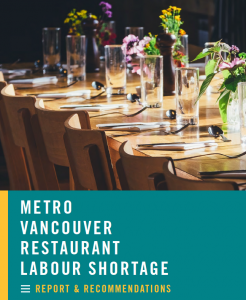Back in January, The BC Restaurant & Food Services Association (BCRFA) held a town hall addressing the problems restaurants faced in filling positions in their restaurants (chefs, cooks, back of house, front of house).

The BCRFA is now recommending solutions for today. Through their research they identified several tactical areas for operators to drive change and improve their staffing results:
Appeal to Today’s Employees by meeting the expectations of Generation Y and Z within the restaurant workplace today. Generation Y and Z employees are considerable influencers on food trends, dining out, and research shows that these workers are demanding more from their employers. They want mentorship, they want to learn at work, and to have the opportunity to grow in their positions. They want to share the values of their employers, but they also value their family and time off. These are things that all employees should want for themselves. As a combined 50% of our current workforce, restaurateurs have to take on the challenge of meeting the needs of these passionate, creative, and entrepreneurial workers because they are the present and the future of our workforce.
Be Strategic about Recruitment by tackling the needs of the business and the needs of the potential employee. It is an investment in time and people. Instead of picking the people that are available, it’s about finding the best people and creating opportunities for them to see themselves in a business long term and to develop their careers with that business in mind.
Schedule Efficiently and Thoughtfully by addressing the issue of long hours. Scheduling employees is a key piece of the retention puzzle. It’s about thinking differently about shifts, including what skills are needed and when. Scheduling according to availability and asking for extra help in the form of overtime, instead of expecting it, instills professional courtesy, and respect among team members. It also helps with retention and attendance. Averaging Agreements are legal options in BC that offer real opportunities for operators to recognize the need for long hours, but also offer employees time off to manage their lives, schooling, and family priorities. These also allow operators to control costs – and potentially increase wages – thereby increasing retention.
Know your Staff by investing in staff teams and by knowing something about them personally goes a long way and helps achieve business growth goals. Understanding their other obligations, personal ambitions, and education goals and being able to work with them to continue to build loyalty is essential. In the Metro Vancouver area, operators need to be aware of employees’ housing and transportation needs. If someone travels two hours to work, eight hours between shifts is not enough to make sure they are performing at their best.
Be Part of Building a New Culture by nurturing culture is as much about sharing what you believe in as an operator as understanding what motivates and inspires your workers. Tackling the public face of the culture in kitchens is essential. Vancouver operators may not be doing what TV chefs are doing, but the image that TV portrays is strong and it spreads a message that is hard to overcome. The issues of intimidating, aggressive, and sometimes sexist cultures come up time and again and are consistently listed as reasons why chefs and cooks leave a business. These must be addressed and a culture that all team members invest in must be fostered from the ground up.
Be An Influencer by showcasing the everyday heroes, role models, and opinion leaders in the restaurant world. Help put Metro Vancouver restaurants on the career map so that we can invest in our teams and their development. Bartenders, sommeliers, chefs, and restaurant managers enjoy exciting careers that can be profiled. Showcasing career chefs and cooks is essential to building up new engagement in restaurant careers. Increasing visibility isn’t just altruistic. It can help recruit workers for individual kitchens. Restaurateurs and chefs who partner with culinary programs at high school and college levels gain workers by creating personal connections in industry and education.
Change Systems by creating the mental shift to analyze the flow of the work and the roles that each staff member plays allows operators to improve outputs by putting in place technology and work flows that improve efficiency. Some chefs taking part in this research have successfully de-skilled, changing their staffing needs to work with available talent pools. Increasing the prep versus service ratio offers a solution, as does simplifying the serving and plating without compromising taste. Technologies exist that reduce the ambient heat in kitchens (think induction) or help teams with training through, “Smart Kitchens.” This on-screen technology tool can help ensure that team members create dishes more consistently and efficiently.
Disclosure: This post was sponsored by the BCRFA.
